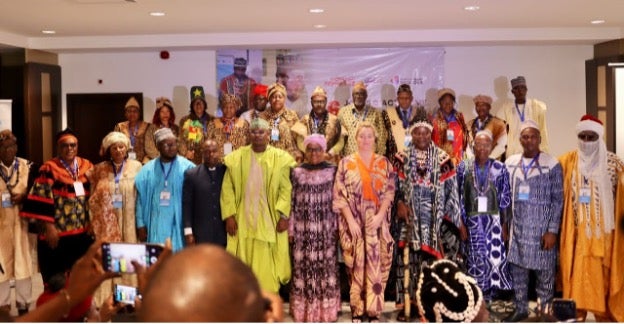African traditional leaders in Douala take ownership of the fight on violence against women and girls.
Douala - Cameroon, Traditional leaders from West and Central Africa met on December 14 and 15, 2022 in Douala to exchange on their contribution in this battle to eradicate gender-based violence in the two sub-regions;
Date:

The forum organized in Douala was attended by 80 traditional leaders from Cameroon, Central African Republic, Chad, Côte d'Ivoire, Democratic Republic of Congo, Liberia, Mali, Niger, Nigeria, Togo, Senegal, and Sierra Leone, and aimed to focus on prevention by addressing the structural causes and associated factors and risks of this violence.
Mrs. Marie-Thérèse Abena Ondoa, Minister for the Promotion of Women and the Family of Cameroon, indicated that "despite the law of silence, the percentage of reported cases is increasingly high with a prevalence of over 40%. One woman in three has been a victim of physical, sexual, or psychological violence in her lifetime”.
In Central Africa, data on the prevalence of intimate partner violence range from 28% in Sao Tome and Principe to over 56% in Equatorial Guinea. The prevalence of child marriage ranges from 21.9% in Gabon to 61% in the Central African Republic. Female genital mutilation, although not practiced in all countries, reaches over 34% in Chad. In Cameroon, 39% of women aged 15-49 have been physically abused since the age of 15, usually by someone close to them. To make an impact and reduce these numbers, UN Women believes a paradigm shift is needed.
Ms. Florence Raes, UN Women's Regional Director a.i. for West and Central Africa, argues that “the first decades may not have focused on a key partnership. Today, it is about working together with traditional and religious leaders because they are the fundamental relays of the realities that girls experience in their communities”.
Traditional leaders are committed to ending violence against women. Chief Fonjinju Tatabong Alexander of Melong in the Littoral region of Cameroon states, “We, the holders of ancestral power, are called upon to use this power to put an end to the various forms of male domination that contribute to the constant reproduction of inequality and violence in our society. The authentic African customs that we defend are favorable to justice and to the protection of women's rights”.
Closing the Forum, Ms. Arlette Mvondo, UN Women Cameroon Country Officer and Technical Chair of the French Muskoka Fund, and the traditional leaders made a list of recommendations: “We would like to make this regional Forum an annual meeting, to launch an innovation award to promote inspiring initiatives of traditional leaders against violence against women and girls, and to organize capacity building and project support workshops to accelerate the implementation of the recommendations”.
UN WOMEN is the United Nations entity dedicated to gender equality and the empowerment of women. A global champion for women and girls, UN Women was created to accelerate progress in meeting their needs around the world. UN Women supports UN Member States in setting global standards for achieving gender equality and works with governments and civil society to design the laws, policies, programs, and services needed to ensure that the standards are effectively implemented and truly benefit women and girls worldwide.
The French Muskoka Fund was created in June 2010 following the G8 Summit in Muskoka, Canada, to help reduce maternal, newborn, infant and child mortality through the strengthening of national health systems.
Media Contact :
Kadiatou Boiro, Regional Communication Analyst, Regional office UN Women WCARO kadiatou.boiro@unwomen.org +221774020052